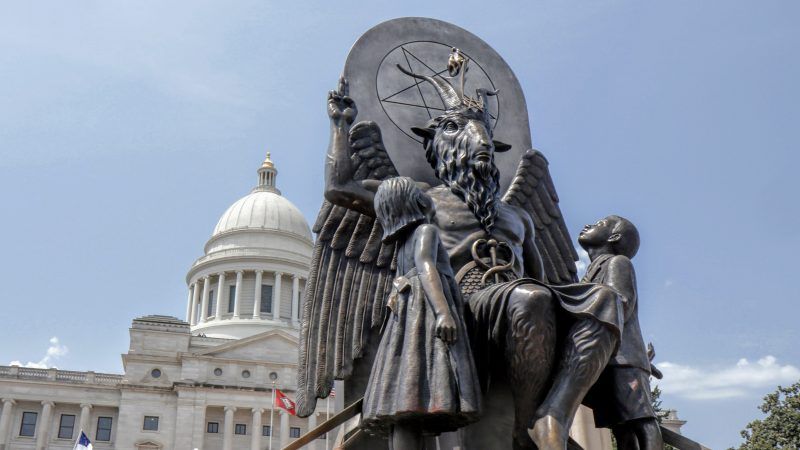Movie Review: Hail Satan?
The Devil gets his due.

Let's say it's 2013 and you're Rick Scott, the multimillionaire governor of Florida, an evangelical Christian, and you're trying to force the introduction of prayer into the state's public schools. One day a gaggle of supporters shows up on the steps of the statehouse. Oddly, they're wearing black hooded robes and their leader has a pair of fake devil horns clamped to his noggin. But they're loudly on your side—they like this school-prayer thing you're trying to pull off. One of them looks up toward a window from which you might possibly be observing and shouts out, "Hail Satan, Rick!"
This maiden provocation by the newly formed Satanic Temple, preserved in director Penny Lane's new documentary Hail Satan?, was instantly embraced in the more tabloid-y precincts of the national media. The Temple members, led by a semi-mysterious character called Lucien Greaves (not his real name, are you kidding?), said they welcomed Scott's attempted end run around the Constitutional prohibition of government-established religion—because that would also clear the way for them. As we see a bemused Chris Hayes summing up their agenda on MSNBC: "You open the door to God, you open the door to Satan."
We've always known God had a sense of humor—how else do you explain pineapple pizza, Jean-Claude Juncker, or the needle-nosed narwhal? Satan, however, is not often thought to be much of a joker. But then the members of the Satanic Temple (TST) don't even believe he exists, except as a literary character (and please note that they're definitely not Satan worshippers). For them, the dark lord is a satirical construct in the pursuit of their mission, which is trolling the culture wars.
"It's a founding aspect of Satanism that you troll people," says Jesper Aagaard Petersen, a Norwegian author and apparent scholar of all things strange and devilish. "That's the original troll, to say, 'Yeah, I'm a Satanist,' and see what happens."
This is what happens. In Portland, Oregon, the local Temple chapter took aim at Christian after-school clubs for kids that were meeting on school property. TST, which is opposed to any infiltration of religious organizations into the public sphere, argued that it should also be allowed to launch a club—an "After School Satan" program, to propagate the values of science and rational thought. Since it's hard to argue against a second religious group after you've already allowed one into your schools, the Satanists prevailed.
TST has larger interests than little club meetings, of course. Jex Blackmore, former head of the Temple's Detroit chapter, says in the film that the goal of modern Satanism is to "challenge the state and oppose the theocratic stranglehold on our morals and sexuality, our identity and our nature." The group's ethical program, unsurprisingly, is basically libertarian: pro-freedom, pro-choice, pro-gay rights, with an insistence on complete bodily autonomy and a preference for "justice over laws." The group also emits a strong goth-punk vibe (the film's soundtrack features Napalm Death, Scar Eater and Marilyn Manson).
Having spent a couple of years making this film, director Lane was able to amass some prime footage. One of the Temple's most memorable exploits, for example, was a "Pink Mass" it held in Meridian, Mississippi, hometown of the odious Fred Phelps, founder of the Westboro Baptist Church—yes, the "God Hates Fags" guy. The mass was conducted at the grave of Phelps's mother, Catherine, and it featured two gay men and then two lesbians leaning across her tombstone and kissing. Said Lucien Greaves, who presided at the event, "His mother is now gay in the afterlife."
The Temple also fights an ongoing battle against the erection of municipal monuments to the Ten Commandments. Interestingly, these stone structures all look so similar—big stylized tablets bearing the famous holy words—because they were originally distributed as promotional items by Paramount Pictures to advertise its 1956 movie, The Ten Commandments. (In a clip from that film we see a golden-calf idolator played by Edward G. Robinson yelling at Charlton Heston's Moses, "We will not live by your law—we are free!") TST's heaviest weapon in battling the spread of these showbiz artifacts across the secular landscape is a seven-foot-tall statue of Baphomet, the goat-headed devil deity—the mere mention of which can sometimes (although not always) persuade the Temple's evangelical opponents to back down.
In 2014, the Temple mounted another bold operation on the campus of Harvard University (Greaves's alma mater), securing permission to stage a Black Mass there as an educational exercise. This infuriated the Boston archdiocese, which called in thousands of protesters—which in turn deeply irritated TST co-founder Malcolm Jarry. "This is the Catholic Church of Boston," Jarry says in the film, "which covered up decades of child rape, moved priests around…let them continue their raping and child abuse—and then had the gall to say what we're doing was sinful? I mean, fuck them."
But Harvard did shut down the Black Mass, just hours before it was to be held, forcing TST to relocate the event to a comedy club above a Chinese restaurant. It was almost like there is no God.


Show Comments (11)